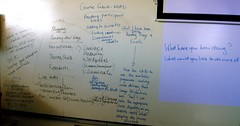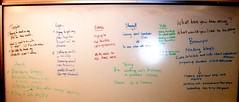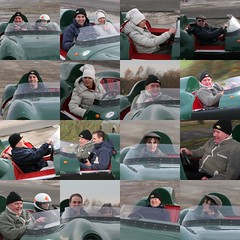
 There was a good turn out over the two sessions for workshop two. Great to see you all there.
There was a good turn out over the two sessions for workshop two. Great to see you all there.
People who could not make Wednesday 23 May are invited to Thursday 31 May at 1 - 3 pm. Bronwyn will start the session off and Leigh and Terry will pop in to do their bits during the session.
Check out the programme for the face-to-face workshop on 23 May and the theoretical stuff we went over which you will need to explore further. This will help you get more of a handle on what educational design is all about when you are thinking about your design plans.
Do you know what is meant by training versus constructing knowledge?
What did we do on the day?
We had a bit of a catch up about where people are at. We asked everyone to write something on the whiteboard about the following two things:
- what they had been doing and
- what they wanted to be doing.
We had quite a bit of discussion about some of the learning theories - behavioural versus cognitive and social constructivism or constructionism. The behaviourist model has its place for getting information across quickly so students obtain mastery of facts. This is essential where safety is involved, and so that learning can be automated e.g. driving a car, assembling machinery, aseptic technique for health workers etc. Cognitive processing relates to the activities we give students to help them retain knowledge so they can commit their ideas to long term memory.
 We all agreed that we shouldn't overload students with content - this affects working memory and is a bit like stuffing too many sox in the washing machine - some will get lost or disappear into the internal workings of the machine.
We all agreed that we shouldn't overload students with content - this affects working memory and is a bit like stuffing too many sox in the washing machine - some will get lost or disappear into the internal workings of the machine.Terry showed us whats what with Word documents and Course Genie (converts Word docs to web pages). He also had some great examples of using audio and video for teaching. We also talked about using Wikis for developing content, and how blogs helped us to express ideas and process information so we didn't have to overload our short term memories. I know I need to do more regular checking of everyone's blogs so I am in the communication loop.
Design theories and models and how they relate to learning theories and learning styles was mentioned, and we discussed how the Community Learning Centres can work with lecturers to support their students; in courses such as massage. It is not about knowing all the content, it is about helping people know where to find content and information. For example how to navigate around online materials, whether they are on Blackboard or in a wiki. This is where facilitation of learning is going to be so important.
How do we facilitate and guide learning without always being seen as the "know it all" experts. Participatory learning - how about that?
We'd love to hear what you think on the subject and how it applies to your students.
Everyone also went away to think about their learner profiles -
- Who are your students and what characteristics do they have coming into a course and leaving?
- What are the fish hooks or issues you need to look at when deciding on the type of strategies you will use in your teaching?
And people were given a suggestion to use the three-step Reflective Framework and template to prepare material for posting in their blogs. It is easiest to select material to write about and then describe what happened (step one). It is harder to analyse what you did and the decisions and actions you will take (steps two and three). That is where the real reflection and deeper learning starts. Do give it a go. The framework and template are now on the course Wiki for you to use.
Now it is time to start thinking carefully about your design ideas for a resource or a course.
Bronwyn


you could put the template up on wikieducator - even as a file to download... would be easier to link to from this blog and group emails if it was on wikieducator...